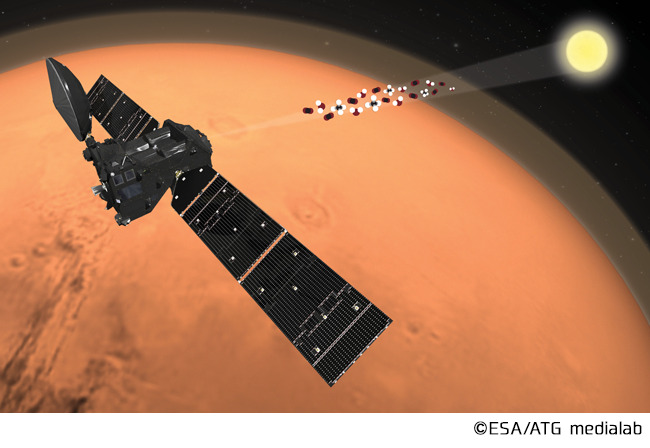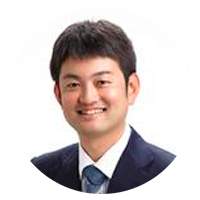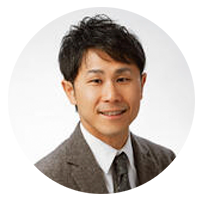I want to contribute to Japan's Mars exploration plan!
Shiraishi: What made you come back to Japan?
(I.e.: While conducting research in Belgium, I learned about Japan's Mars Moon Exploration Program (MMX). MMX (Martian Moons eXploration) is the world's first Mars satellite sample return mission, and plans to return to Earth with samples from the Martian moon Phobos. It was scheduled to be launched in 2024, and I really wanted to be involved in this project.
And by fate, from April 2022, I opened a laboratory in the same group as Professor Imamura of the University of Tokyo, who is leading the Mars observation of the MMX project. Satellites launched by MMX can continuously photograph Mars by orbiting the equatorial plane of Mars like the meteorological satellite Himawari, which is extremely superior in terms of detailed meteorological observation.In addition, it is thought that dust particles that have been blown up from Mars by meteorite impacts are also included in the samples collected from Phobos. doing.
Why I chose the path of research, its interest and difficulties
Shiraishi: You have continued to search for the best research environment in Japan, Italy, Belgium, and then Japan. When did you first start aiming to become a researcher?
(I.e.: As I said at the beginning, it was after watching a special program on NHK when I was in high school.In my master's course, I thought about getting a job at a general company, but I wanted to continue to enjoy the "joy of learning about unknown things for the first time in the world" and the "fun of scientifically verifying the truth." aspired to become a researcher.
Shiraishi: It's certainly a big attraction to be the first to know in the world.On the other hand, what is the difficulty?
(I.e.: In planetary science research, many researchers are involved in one project, so while there is the advantage of being able to share various know-how, there are also difficulties such as competition for themes and mistakes in collaboration.While reaffirming the importance of "communication", I always strive to share information with team members to deepen mutual understanding and promote research.
Shiraishi: That's the good and the hard part of working in a team.Finally, please tell us about the future prospects of your research.
(I.e.: I think this applies not only to research on Mars but also to other planets, but advances in observation technology have improved the accuracy of observations, giving us unprecedented new information about the atmosphere, surface environment, and the origin of life. is expected to be obtained.
Currently, I am interested in a wide range of terrestrial planets, so I am gradually advancing my research on Venus as well as Mars.Venus also had abundant water in its early days, but it has been pointed out that it may have been lost to outer space like Mars.Unlike Mars, Venus is not rich in observational data, but because it is a scorching planet, the theory that the greenhouse effect occurred due to the rapid temperature rise is leading.
Around 2030, it has been decided that Europe and the United States will launch probes to Venus one after another, so I would like to contribute to those projects as well.After that, we would like to expand our knowledge base to the study of extrasolar terrestrial planets.

Message to high school and university students
Shiraishi: Finally, please give a message to high school students, university students, and future researchers.
(I.e.: I think that cherishing the feeling of "I want to be like this, I want to do this" and acting without missing the moment will be the key to opening a path for the future.In my case, when I was a high school student, after watching NHK's Mars special program, I read information on the Internet and other sources, and imagined the future prospects.
I don't know when or what kind of moment a similar moment will come to you, and I think it's probably different for each person, but I think it's important to prepare for that moment.If there is something you are interested in, visit it yourself, talk to your seniors about it, and get information from books and the Internet.Also, it is important not to spare time to envision the future.
By the way, for those who are interested in the field of planetary science and astronomy, as a general rule, data obtained from planetary exploration should be made public after six months, so anyone can see it.For example, NASA's planetary data system (https://pds.nasa.gov/) is recommended because it allows you to view not only difficult data, but also images taken by cameras mounted on planetary probes.

Lecturer, Graduate School of Frontier Sciences, The University of Tokyo
Mr. Shohei Aoki
Graduated from the Faculty of Science, Tohoku University, and completed the doctoral course at the Graduate School of Science, Tohoku University.Postdoctoral Fellow, Italian Institute of Space Science (INAF/IAPS), Postdoctoral Fellow, Royal Belgian Institute for Space Science (IASB/BIRA), Research Fellow, Belgian National Science Research Fund, University of Liège (ULiège), Project Researcher, Institute of Space and Astronautical Science, Japan Aerospace Exploration Agency In April 2022, he became a lecturer at the University of Tokyo Graduate School of Frontier Sciences, Department of Complexity Science and Engineering.4 Distinguished Researcher at the University of Tokyo (open recruitment).He graduated from Kokugakuin Kugayama High School.

Kyoto University Graduate School of Agriculture Assistant Professor
Dr. Kosuke Shiraishi
Graduated from Faculty of Agriculture, Kyoto University in 2012. Completed master's program at Graduate School of Agriculture, Kyoto University in 2014.While enrolled in his master's program, she was sent to Bangladesh as a short-term Japan Overseas Cooperation Volunteer through the Japan International Cooperation Agency (JICA). After working as an intern at the Food and Agriculture Organization of the United Nations (FAO) in 2015-2016 and as a JSPS Research Fellow in 2016-2017, she received her Ph.D.In the same year, he completed the Shishukan program at the Graduate School of Kyoto University.After completing the doctoral course at the same graduate school, he worked in the Ministry of Foreign Affairs Economic Affairs Bureau Economic Security Division as a foreign affairs clerk from 2017 to 2017. After serving as FAO Junior Specialist in 2018-2018 and FAO Food Safety Specialist in 2020-2020, he has been an Assistant Professor at the Graduate School of Agriculture, Kyoto University since January 2021.

- 1
- 2


